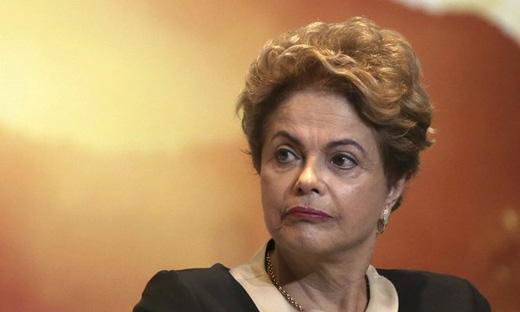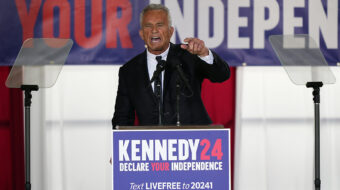
Late Sunday evening, the much anticipated vote in the Brazilian Chamber of Deputies (the lower house of the national Congress), on the impeachment of President Dilma Rousseff, took place in a raucous atmosphere of shouting, pushing and posturing. Deputies got up to vote one by one, and each was allowed ten seconds to give the reason for her or his vote in favor of, or against, impeachment. In the end the impeachment motion passed by 367 votes in favor, 127 against, seven abstentions and two not voting. This represented well over the two thirds (342) of the 513 members of the Chamber which was needed to proceed with impeachment.
Earlier, a Chamber of Deputies Impeachment Committee voted 38 to 27 to recommend impeachment to the full chamber. At the time, it was pointed out that almost all of the 38 who voted “yes” are under investigation for corruption themselves. Most of the accusations come out of a massive scandal called “Lava Jato”, or Car Wash, in which various private companies paid kickbacks to politicians and officials to be able to get subcontracts for work with Petrobras, the country’s massive state oil company, which is developing huge new offshore oil resources. Members of Rousseff’s own Workers’ Party (Partido dos Trabalhadores or PT) are among the accused, but so are a people of other political backgrounds.
These massive corruption scandals are going on in Brazil in the context of a serious economic downturn. But President Rousseff is not being impeached for corruption nor is she accused of it; indeed, she is one of the few major politicians in Brazil who can boast of that. Instead, she is being impeached for supposedly violating her fiduciary responsibilities by using state bank funds to cover national budgetary deficits in 2014 and 2015. Others have done this without serious consequences before, so the motives for pushing impeachment now are suspect.
Many on the left see the whole “impeachment” maneuver as a de facto political coup d’etat which has the dual purposes of reversing progressive measures of the current government and protecting some very corrupt people from prosecution in the Lava Jato case and other acts of public corruption.
Should the Senate remove President Rousseff from power, her place will be taken by the current vice president, Michel Temer, who is seen by many as one of the two main architects of the coup, the other being the president of the Chamber of Deputies, Eduardo Cunha. Both of these gentlemen are from the PMDB, the Brazilian Movement for Democracy Party, which was formerly allied with the government but now has broken with it. (The PMDB is the largest of several Brazilian political parties which can not be categorized ideologically; rather, they are clientalist outfits which maintain themselves by distributing jobs and contracts to their followers, in the fashion of the Revolutionary Institutional Party (PRI) in Mexico or the old Cook County Democratic machine that ruled the U.S. city of Chicago for many years.) The two Workers’ Party presidents, Lula and Dilma Rousseff, found it necessary to form an alliance with this party so as to have enough votes in Congress to get their laws passed.
But both Cunha and Temer are facing serious allegations of their own. Cunha, a figure of the right personally, is an Evangelical Christian accused of using a mega church he controls to launder bribe money related to the Petrobras scandal, and his name figures prominently in the “Panama Papers” affair. Temer, for his part, is accused of being complicit in the supposed financial crimes of which Rousseff is accused, for which reason some argue that he, too, should be impeached. There are also rumblings about a possible connection of Temer to corruption.
The leader of the Communist Party of Brazil’s delegation in the Chamber of Deputies, Daniel Almeida, wrote in his party’s online newspaper Vermelho: a Esquerda Bem Informada) (“Red: The Well Informed Left”) about the “surreal” events of Sunday night, in which “an honest president, who is not the target of accusations of corruption, has her mandate threatened by a conspiracy of corrupt people led by the president of the Chamber, Alvaro Cunha (PMDB,, RJ), accused in Operation Car Wash (Lava Jato). ….The conspiracy became clear in the debates through the day. Nobody mentioned any more the report presented in the Impeachment Committee by Jovair Abrantes (PTB-GO), because the opposition knows that there are no facts which justify prosecution of a president elected by 54 million votes” . Other observers noted that as each pro-impeachment deputy got up to give his or her allowed ten second comment, “one could count on the fingers of one hand” the number who actually mentioned the legal basis for the impeachment; most of the rest made general comments about corruption, of which Rousseff is not accused.
Many other people, including some who do not necessarily approve of Rousseff, criticized the demagogic show that accompanied the vote in the Chamber. Martise Matos, a Professor of Political Science and coordinator of Women’s Studies at the University of Minas Gerais, was quoted by the Jornal do Brasil as saying “I find it appalling, in a republican country, which has principles of laicism [or secular control] of the state, to raise religious and family arguments.” The governments of Lula da Silva and Rousseff have taken progressive positions on many social issues, which has raised the anger of the right wing and certain Evangelical and traditional Roman Catholic Christian sectors, but this was not at all part of the argument presented by the Impeachment Committee. That so many right wing deputies raised the issue reveals what the real agenda of the impeachment faction really includes. In Brazil as in the United States, the president cannot be impeached for carrying out policies that certain people don’t like, only for specified crimes. Yet the impression lingers that Rousseff was on trial because of other people’s corrupt behavior, because of the economic slump, and because of her and Lula’s progressive social policies that have been beneficial to working, class, poor and minority people, including especially Afro-Brazilians who have been helped by affirmative action programs in higher education and other matters.
Both Cunha and Temer support austerity and privatization as the solution to Brazil’s economic problems. This stance, which threatens to undo the vast improvements in the lives of working people achieved by Rousseff and her predecessor as president, Luiz Inacio Lula da Silva (Lula), will put them into a direct confrontation with the mobilized base of the PT, the left and the labor unions. An even bigger and more bruising struggle is ahead. But the first step is for the Brazilian Senate to take up the impeachment motion. On Monday, the decision of the Chamber of Deputies was to be formally delivered to the president of the Senate, Renan Calheiros, who is from the PMBD, the same party as Cunha and Temer (at this point the reader will not be surprised that Calheiros also faces serious accusations of corruption). Calheiros will name a 21 person Senate impeachment committee. If this committee approves an impeachment motion, it will be presented to the full 81 person Senate for an up or down vote; if the vote is in favor of impeachment Rousseff will have to step down for 180 days and be replaced by Mr. Temer during that time. To permanently remove Rousseff from office, the Senate will have to vote by a two thirds majority. If this is not achieved, Rousseff will return to finish the term to which she was re-elected in 2014 If she loses the vote in the Senate, Rousseff’s only recourse will be to the Supreme Tribunal, the country’s supreme court.
A lot can happen in the meanwhile. Opponents of impeachment, including labor unions, the Landless People’s Movement (MST) and the left continue to organize against it. They are also receiving statements of support from concerned people abroad, including the AFL-CIO in the United States. AFL-CIO President Richard Trumka issued and unprecedented, strongly worded statement on the Brazilian Crisis, saying that the federation “vehemently rejects the effort to invalidate the progressive policies designed to build inclusive democracy in Brazil”.
But at the same time, damage is being done to the economy and Brazilian society is increasingly polarized.
Photo: Dilma Rousseff | Eraldo Peres/AP












Comments